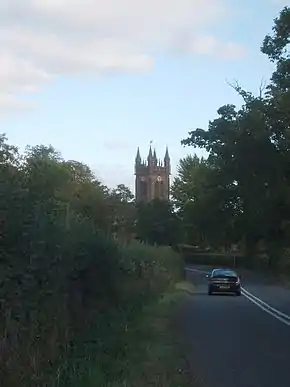A458 road
The A458 is a route on the UK highway network that runs from Mallwyd, near Machynlleth, in Wales, to Halesowen, near Stourbridge, in England. On the way it passes through Welshpool, Shrewsbury, Much Wenlock, Bridgnorth and Stourbridge.
| |
|---|---|
 | |
| Route information | |
| Maintained by Highways England, English local authorities and North & Mid Wales Trunk Road Agency | |
| Length | 86 mi (138 km) |
| Major junctions | |
| West end | Mallwyd |
| East end | Halesowen |
| Location | |
| Primary destinations | Welshpool Shrewsbury Bridgnorth Stourbridge |
| Road network | |
History
Welshpool to Shrewsbury
The road was one of several from "Welch Gate and Cotton Hill" (sic) turnpiked on 1758.[1] Between Buttington and Halfway House the original course of the road was abandoned after it was disturnpiked in 1837. It was replaced by a new road built along the foot of Moelygolfa (hill), built in 1801. This Turnpike Trust ended in 1877.[2]
Shrewsbury to Bridgnorth
This road is likely to be Anglo-Saxon in origin, as it links the burhs of Bridgnorth and Shrewsbury. It was used by the army of Henry I, which cleared trees near it on Wenlock Edge to make the road safe. The road was turnpiked in 1752, the trust being solely concerned with this road. It remained a turnpike until 1875.[3]
The Bridgnorth bypass, opened in 1985, was classified as A458, taking the main road around the south of the town,[4] previously it ran through Low Town, but ran along low ground at the foot of the hillside up to the town centre.
Bridgnorth to Quinton
The final section of the road was a late creation, consisting of a road laid out in 1805 when Morfe Heath was enclosed (as far as Six Ashes and then various existing roads for the rest of its route. This was turnpiked in 1816 and remained under the control of a trust until 1877. It terminates in the Quinton area on Halesowen's border with Birmingham and Oldbury.
Until the 1950s, it terminated in Halesowen town centre, but was extended approximately two miles eastwards in the 1950s along the former route of the A456, which was by-passed on a new road around the south of the town.[5]
See also
References
- Statute, 31 Geo. II, c.67.
- B. Trinder, Industrial Archaeology of Shropshire, 192 255
- Statute, 25 Geo. II, c.49; B. Trinder, 253.
- geograph.org.uk
- Statute 56 Geo. III, c.16; B. Trinder, 258.


